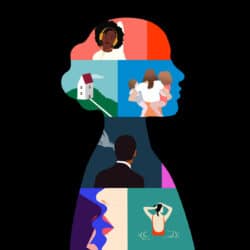Many in the sector are exhausted from the weight of living through a barrage of crises as a result of imperialism and colonialism – “there is a historic, cumulative grief we cohabitate with,” Lydia Phillip writes. “We are survivors of this grief, but it isn’t recognized on the job. It defies the boundaries of any workplace bereavement policy.”
It’s eight in the morning. It’s just another workday, except in the middle of the night a video of a father holding his deceased child is circulated online. As a pot of coffee brews, a man is fighting for air, “I can’t breathe” on repeat to anyone who will listen. The news reports another xenophobic public attack, prompting reshares with the “Stop Asian Hate” hashtag; in the next story, the location of another unmarked grave found at a Canadian residential school is mapped out. While computers install the latest systems update, another law supporting trans rights is repealed. It’s eight in the morning and it’s expected to be just another workday.
I’m supposed to be finalizing my second article as part of my writing fellowship with The Philanthropist Journal. I should be smoothing sentences, polishing words, and delivering another piece on neurodivergence and menstruation. And though that is important, I grapple with how I am to carry on writing about periods and workplace practices when people are bleeding out, when women are using tent canvas to absorb menstrual blood, when those who are pregnant and chest-feeding don’t have access to basic nutrients let alone medical care. How do we go to work every day like everything is normal?
How do we go to work every day like everything is normal?
It is morning and I’m exhausted from the accumulating weight of living through a barrage of crises as a result of imperialism and colonialism – many of us are, whether we realize it or not. How many violent images, black squares, and hashtags must we endure? How much suffering must we bear witness to, all while constantly grieving and concealing ourselves in order to show up to work?
To experience community at the intersections of oppression is beautiful. But when our kinship spans blood, borders, and oceans, their suffering is also ours. For those who are Black, Indigenous, Palestinian, racialized, a woman, gender non-conforming, queer, disabled, a newcomer – there is a historic, cumulative grief we cohabitate with. We are survivors of this grief, but it isn’t recognized on the job. It defies the boundaries of any workplace bereavement policy.
Most of us cannot afford to grieve. In this constant mourning, capitalism demands our resilience while holding our lives as collateral.
9:30 in the morning (January 2018)
I go to work at 9:30 a.m., half an hour late, the day after my only living grandparent has passed; my Grammy. The previous evening, I’d been sitting at the kitchen table, legs folded underneath me, tapping away at my keyboard, strained eyes squinting at a laptop screen after a long day of work carried into the night – this is when I got the call. Grammy – the one who gave me my earliest memory of a teddy bear that was mine to squeeze; the one who would chase my cousins around the house while I innocently watched on before we were all shooed outside; the one who was always there for birthdays and Christmas Eves; the one whose kitchen I know so intimately; the one who loved Kenny Rogers, bowling, playing darts, and casino buffets – is gone. Death and grief are intricate things, when someone is tethered to this earth now only by memory and story.
After a sleepless night haunted by sorrow and the type of remorse that accompanies loss, I go to work. I don’t feel like I have a choice. A few handfuls of cold water splashed onto my face is a weak remedy for the tear-streaked cheeks, swollen eyes, and racing mind. It doesn’t take long after locking the door behind me and settling at the office to fully break down. The pretense doesn’t take much to shatter. While sobbing at my desk, my supervisor affords me a brief moment of humanity where I share a little about my grandmother. My anecdotes garner condolences and words of sympathy before I’m then expected to return to my task list. I work the rest of the day and week.
We collect and carry grief with us, from family we are close with to chosen loved ones to distant relatives. We also bear experiences and the suffering of those we see ourselves in, people from ancestral homelands, or with whom we feel a kinship. Technology has globally connected us in a way like never before, exposing us to new horrors daily – an endless cycle of mourning with each morning.
Grief is a Groundhog Day.
Mid-morning (spring 2020)
My coffee is cold. Spring 2020 has gone by in a blur with streaks of pain, hopelessness, and fatigue. Throughout the swirling mass of months, my tongue forms names that I’ve committed to memory: George Floyd, Regis Korchinski-Paquet, Breonna Taylor, Tony McDade, and Ahmaud Arbery – who was my inspiration for channelling and processing the pain into a creative outlet. I wrote a piece after Arbery’s death in April that received its most attention in the wake of George Floyd’s public murder and the global outcry that followed that summer. The scale of the 2020 Black Lives Matter movement was catalyzed in part by our increased digital presence from the COVID-19 pandemic spurring the rise of social media as a tool for activism.
I empathize with the people who are alone and isolated in their workplaces, the ones seen as ‘too loud,’ ‘too political,’ such a ‘killjoy.’
After reading articles and hearing stories from lone Black employees at their organizations, I can’t help but feel grateful to work at an all-Black non-profit. I feel fortunate that the team who also has to log on in the morning has a shared understanding. We witnessed the same brutality and are going through it together. I empathize with the people who are alone and isolated in their workplaces, the ones seen as “too loud,” “too political,” such a “killjoy” – the ones whose sole voice often carries heavy conversations. The lone person who must perform in hopes that the humanity of an entire group is recognized.
May and June 2020 deal another type of loss: a bitter consciousness of who values your community’s struggle and who excludes you socially, rolling their eyes because your posts are “too much.” I see who is speaking up and engaging and who is silent. Black people are being executed in the streets and people are posting brunch pictures as if the world isn’t on fire. The grief of constantly having to proclaim our humanity is, for some, just another post to scroll past. I still feel the exhaustion deep within my bones, and truthfully, I don’t think it will ever pass.
Twelve noon (fall 2023)
I jab my fork into a Tupperware container, leftovers as lacklustre as the mindless scrolling on my phone until I am jarred back to reality by an updated death toll. Scroll. Transphobic vitriol. Scroll. Blatant disregard for life. Scroll. Social media has become oversaturated with violence to the point where it is nearly impossible to avoid. A break from work is never really a break – will it ever cease?
We are witnessing country-wide organizing against the 2SLGBTQIA+ community as anti-trans and anti-queer protesters use online platforms to mobilize at an alarming rate. While these hateful demonstrations are marketed, supported, and cropping up in cities, threatening people’s safety – life for queer folks does not stop. How easy is it to be productive and “professional” in the workplace when an expanding national movement is arguing that you have no right to exist?
Disinformation and insidious rhetoric are spread with the click of a button. We see apathy and complicity in the way “X” decides what constitutes “hate speech,” which has surged since billionaire Elon Musk bought the platform in late 2022. We see censorship and silencing when companies like Meta filter out certain words, hashtags, and content – or ban the sharing of news altogether. What about those of us who can’t simply exit an app after our lunch break and return to work?
3:30 in the afternoon (winter 2024)
At the metaphorical watercooler, we get a sense of what is safe to discuss in the workplace. Among project updates and small talk of weekend plans, I wonder if anyone else is burning up inside. Do they also look for glimpses of a falling facade or splintering mask through hallway chit-chat, Zoom calls, and meetings that could have been an email? Is there anyone who feels what I’m feeling?
There can be severe consequences for speaking up about politics at work. Backlash and retaliation can be subtly or overtly dealt when your perspective isn’t aligned with the dominant narrative. I’m hearing countless stories of racialized women and members of equity-deserving groups getting fired, laid off, or criminalized. People have had funding pulled or been abandoned by their colleagues; many of these same workers, along with students, participate in demonstrations in the streets. Some are being detained, deported, and thrown in the way of batons and pepper spray. All are risking their futures and livelihoods, which are chained to success at work.
It’s no wonder that burnout is compounded in the non-profit sector.
Society expects us to ignore our own suffering, and that of people around us, so we can continue being productive at the expense of social change and collective wellness. We often push on until we can’t, because to compartmentalize is to survive. It’s no wonder that burnout is compounded in the non-profit sector. A sector that is marginalized by the nature of its work to address complex systemic issues is also one that employs a large percentage of women, queer people, Black and Indigenous people, and newcomers. Missing work and being debilitated by emotional and psychological distress often isn’t an option. Grief accrues more rapidly than sick days.
This is on my mind as I pack up my various forms of baggage to go home.
Five o’clock (June 2024)
It’s rush hour and as I inch along in traffic, I notice the infrastructure: two stretching bridges, red and white smokestacks spewing manufactured clouds, old buildings and cathedrals dutifully preserved. Those who feel connected to these landmarks need not worry about their neighbourhoods being razed to the ground and turning to ash, as is happening around the world. From my vantage point, I see a hospital, the one closest to where I live. I know the route I would take to seek medical attention. Meanwhile in Gaza, less than a third of hospitals are even functional, airstrikes and explosions severely reducing the capacity.
As the city’s commuters converge on their way to their residences, I think of the fact that my short trip home is roughly the length from end to end of the designated “humanitarian zone” near Rafah. My municipality has expanded in the past years, becoming home to around 500,000 people. It often doesn’t feel big enough to hold the amount of growth; a city not set up for increasing needs – resulting in insufficient housing, healthcare, and public transit. Then I consider how more than a million Palestinians are displaced, seeking shelter, and relegated to a mere 6.5-square-kilometre area – which is roughly the area I can see from my fourth-floor apartment after my short commute home.
This evening
Grief can be a bitter reckoning of obvious choices in hindsight. A few months before Grammy died, I had an opportunity to visit with her, but I put my job first. I was working remotely while visiting my parents. My mom waited until she caught my attention before asking if I could join her, my aunt, and Grammy for a bite to eat down the street. I glanced at the time, mentally shuffling all the little tasks and my “to do list,” arriving at the calculation “No, I can’t.” Unbeknownst to me, that was the last time I could have seen my grandmother. Today, it is glaringly stark how unimportant the “critical” work I had ultimately prioritized was.
There is no ‘clocking out’ for those subjected to war. Our work, especially in non-profits, can feel futile in the face of these catastrophes.
I sit on my couch while fatalities rise with the crashing of bombs and the unearthing and digging of mass graves. There is privilege in sitting here writing, reflecting, and even in having the distraction of work throughout these crises. There is no “clocking out” for those subjected to war. Our work, especially in non-profits, can feel futile in the face of these catastrophes. As we’re forced to deal with bureaucracy, competing priorities, and trivial work made urgent, we question our purpose and place in it all. Grief keeps amassing when it feels like we’re screaming into a void, begging those around us and in power to care. We wonder if our small acts will ever be enough.
Our actions have an impact, even if we don’t see the effects until later, or in our lifetime. Every injustice is a thread connected; the necessity of working to survive, unequal distributions of wealth, the invasion and resource pillaging of less powerful nations; and how we treat Black and Brown lives. Tugging at the fibres of white supremacy in whatever way you know – creating, resting, organizing, boycotting, protesting, fundraising, calling politicians, educating, waking up – is an act of resistance.
One day our small acts will collectively unravel it all.
This is the second piece from Lydia Phillip, one of five writing fellows working with The Philanthropist Journal. The fellowship is focused on the future of work and working and was made possible through funding and support from the Workforce Funder Collaborative.


